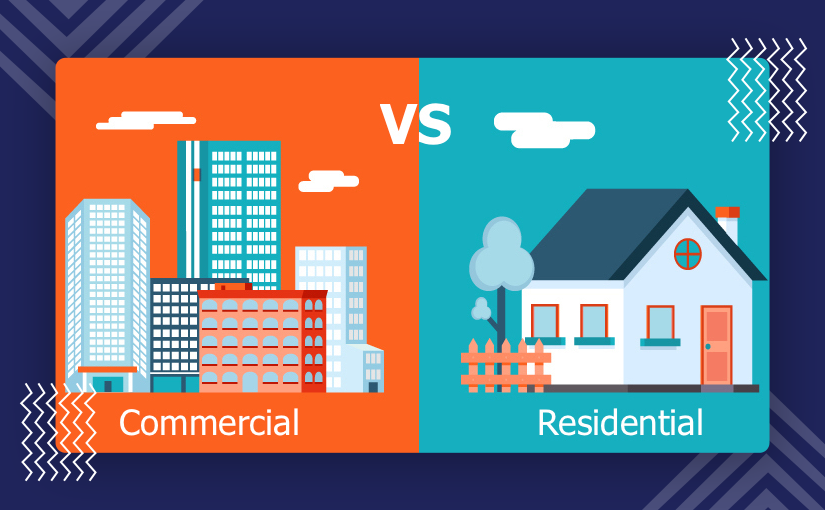

Cash Flow Kingdoms: Decoding the Pros and Cons of Investing in Commercial vs. Residential Properties for Rental Income!
4th December, 2023

Planning to delve into the real estate sector for a reliable source of income? The choice between residential and commercial properties might be perplexing. This article will guide you through the intricacies of both options, shedding light on factors like location, operational costs, and tenant availability.
Why Commercial Properties Trump Residential Ones?
1. High Demand for Commercial Properties
In the thriving Indian economy, the demand for commercial spaces remains consistently high across cities. The appreciation in property prices adds to the allure, allowing investors to diversify their portfolios. Even during industry downturns, businesses and multinational corporations continue expanding in the commercial sector, sustaining a robust demand for commercial properties.
2. Longer Tenancy Periods
Unlike residential properties, commercial spaces boast longer tenancy periods and higher rental yields. This ensures a steady income stream for investors. Lease tenures for commercial properties typically range between 5 to 10 years or more, providing stability in income.
3. Tax Benefits
A commonly overlooked advantage of investing in commercial real estate is the associated tax benefits. Property owners can enjoy deductions on interest from property loans and depreciation. These savings contribute significantly to long-term financial growth.
4. Growth Potential
Commercial estates outshine residential properties in terms of growth potential. Strategically located in areas undergoing economic expansion, commercial properties, especially in prime technology hubs and business districts, attract real estate experts' recommendations. Investing in retail spaces, office spaces, and self-storage facilities proves to be a shrewd decision, consistently yielding better returns compared to residential properties.
Key Considerations for Commercial Property Investment
5. Location Matters
The success of a commercial property investment hinges on its location. Choosing a property in a thriving business district or a burgeoning technology hub ensures sustained demand and increased property value over time.
6. Understanding Operational Costs
Before diving into commercial real estate, it's crucial to grasp the operational costs involved. These may include maintenance, utilities, and potential renovations. Accurate projections of these costs are essential for an informed investment decision.
7. Market Analysis for Tenant Availability
Conduct a thorough market analysis to gauge tenant availability in the chosen commercial property segment. Understanding the demand and supply dynamics helps in predicting occupancy rates and rental income potential.
Comparative Analysis: Residential Properties
8. Residential Properties: A Brief Overview
While residential properties are a staple in real estate, their returns may not match those of their commercial counterparts. Residential investments are generally considered safer but might lack the robust growth potential seen in commercial estates.
9. Shorter Tenancy Periods
Residential properties usually come with shorter tenancy periods, ranging from 6 months to a year. This can result in more frequent tenant turnover, leading to potential income fluctuations.
10. Tax Considerations for Residential Investments
Tax benefits for residential properties are available but are generally not as favorable as those for commercial real estate. Investors should carefully weigh the potential returns against the tax advantages.
11. Growth Potential in Residential Areas
The growth potential in residential areas is often slower compared to commercial districts. While residential properties offer stability, they might not provide the same level of appreciation seen in commercial real estate.
Making the Decision: Commercial vs. Residential
12. Balancing Risk and Reward
Investors must carefully balance the potential risks and rewards associated with both commercial and residential properties. While commercial estates offer higher returns, residential properties provide a safer investment environment.
13. Diversifying Your Portfolio
Consider diversifying your real estate portfolio by incorporating a mix of both commercial and residential properties. This approach can help mitigate risks and ensure a more stable long-term investment strategy.
14. Consulting with Real Estate Experts
Seeking advice from seasoned real estate experts can provide valuable insights. Professionals can offer guidance on market trends, potential pitfalls, and optimal investment strategies based on your financial goals.
Conclusion
In the realm of real estate investment, the choice between commercial and residential properties boils down to your risk appetite, financial goals, and investment strategy. While commercial properties offer higher returns, they come with increased complexities. On the other hand, residential properties provide stability but might lack the rapid growth seen in the commercial sector. The key lies in striking a balance that aligns with your investment objectives.
Frequently Asked Questions (FAQs)
1. Is investing in commercial real estate riskier than residential real estate?
Balancing risk and reward, commercial real estate tends to offer higher returns but comes with increased complexity and potential volatility.
2. What are the key tax benefits of investing in commercial properties?
Commercial property owners can enjoy deductions on interest from property loans and depreciation, contributing to long-term financial growth.
3. How can I assess the growth potential of a commercial property?
Strategic location, such as in prime technology hubs and business districts, is a key indicator of growth potential in commercial real estate.
4. Are there tax considerations specific to residential property investments?
While tax benefits exist for residential properties, they may not be as favorable as those associated with commercial real estate.
5. How does tenant turnover differ between commercial and residential properties?
Commercial properties generally have longer tenancy periods, offering more stability compared to the shorter tenancy periods common in residential properties.
6. Can a diversified real estate portfolio include both commercial and residential properties?
Yes, diversifying your portfolio by incorporating a mix of both types of properties can help mitigate risks and provide a balanced investment strategy.
7. What role does location play in the success of a commercial property investment?
Choosing a commercial property in a thriving business district or technology hub is crucial for sustained demand and increased property value over time.
8. How can real estate experts assist in making informed investment decisions?
Seasoned real estate experts can provide valuable insights into market trends, potential risks, and optimal investment strategies based on individual financial goals.

